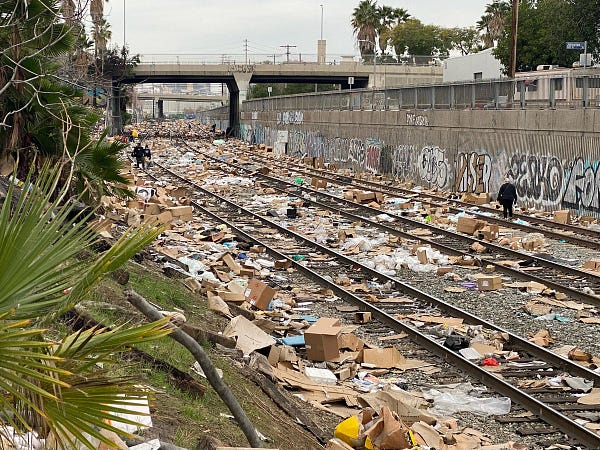The Casualties Of Anarcho-Tyranny
Michelle Go is dead because the state consciously decided doing right by her killer was more important than her safety or that of anyone else.
Michelle Go, 40, was killed when she was shoved in front on an oncoming train at a New York City subway station.
I came across this thread today on Twitter that explains the concept of anarcho-tyranny very well:


Michelle Go is an Asian-American woman who was shoved in front of an incoming New York City subway train while she was standing on the platform. She was killed instantly (and, hopefully, without suffering). Her murderer, who’s since been arrested, is Black. The crime doesn’t appear to be race-related, though it didn’t stop some from using the #StopAsianHate hashtag, which has diminished in visibility on social media since last year.

More:




The issue of repeat offenders and obviously violent criminals being released after being arrested has been a common thread in the current American crime wave. This is happening in large part because the government, at all levels, is increasingly run by people who believe crime to be a failure on the part of society and that criminals are the real victims (the “root causes” doctrine). Then there’s the race angle - when it comes to people of color, those in power believe systemic inequality is the reason why they commit crimes and are arrested and punished to a disproportionate agree. Therefore, they believe a lesser emphasis should be placed on tackling crime and more on correcting the bugs in the system.
In practice, however, this amounts to not enforcing the law at all. Furthermore, it sounds suspiciously like a form of ransom: “Fix things - or else!” More important, the sheer brutality of crimes like the one committed against Michelle Go is well above and beyond that committed out of desperation. The connection between crime and poverty is far from straightforward, but, even if desperation does cause someone to shove someone in front of an oncoming train, who would want to live in such a society?
Newly-minted NYC mayor Eric Adams, who ran on a tough-on-crime platform, committed arguably his first blunder in office with his comments in the wake of Go’s death, saying, “I think it’s about 1.7 percent of the crimes in New York City that occur on the subway system. Think about that for a moment. What we must do is remove the perception of fear.”
Assuming his numbers were accurate, there’s a time and place for talking statistics. Less than 24 hours after the death of Michelle Go wasn’t the time, especially after spending a year convincing voters that, yes, he agreed the city was being ravaged by crime, and that he would deliver the city from evil. In fact, Adams seemed to realize his error and walked back his comments yesterday, admitting (or pretending) that he, too, felt unsafe when riding the subway.
Nor is there a “perception” of fear. Subway crimes are up 107.1% from the same time last year. The sudden, if brief, change in tone from Adams after he took office gives you a sense that, all rhetoric aside, restoring law and order to the city isn’t really in the cards. This means nothing’s going to change this year and crime will likely continue to get worse in New York and elsewhere. The reality is that soft, indirect measures, which the Left prefers when dealing with crime, don’t make a difference against those who have no inhibition against causing harm or killing. The Left’s failure to recognize the brutal reality of crime and those who commit them and their romanticized view of criminals as merely “the troubled” in need of help and sympathy hardly addresses the “root causes” of crime, but enables it.
Michelle Go is dead because the state consciously decided doing right by her killer was more important than her safety or that of anyone else. In the eyes of the Regime, Go is merely unavoidable collateral damage, a necessary sacrifice in the pursuit of social justice.
But how does the Regime get away with this? Contrary to conventional wisdom, a regime’s credibility isn’t rooted in its ability to deliver productive outcomes for the body politic. Instead, it’s rooted in:
A monopoly on the legitimate use of violence;
A monopoly on legitimacy.
The first principle is self-explanatory, the second needs a bit more explaining. By having a monopoly on legitimacy, this means the regime, state, whatever, needs to be the only game in town as far as making the rules. This is something of a zero-sum game: if two opposing forces are competing for control over a geographic area, neither one is considered legitimate.
Once it achieves this monopoly, however, the regime can outsource rule-making as long as it maintains a monopoly on violence. This doesn’t mean the rules change, but the rules are applied differently. The authorities won’t do anything about violent protesters blocking the street or an evidently dangerous person shouting threats at passerbys, defecating in the streets, or damaging property, but they will make sure mask rules are enforced and even the briefest parking violation is punished. The law-abiding citizen is an easy target by virtue of being someone who reinforces the legitimacy of the system, whereas the criminal, by operating outside the system, has much freer reign and needs to physically harm or kill someone before the authorities react.
In this system, which rule is being followed? The rule of law? Or the rule of anarchy?
The tyranny comes into play when talking about what the Regime is trying to achieve through anarchy. It’s certainly trying to reinforce its hold on power - anarchy can only be addressed via a tyrannical response, after all. Consider what we’ve learned about Eric Adams - as a member of the class of Americans who created the crime problem, he parlayed the situation to the top leadership position of arguably the world’s most influential city.
But, more importantly, consider what this class believes. Here’s just a few beliefs held by the elites:
Crime is the result of systemic inequality;
Justice comes only in equal outcomes (as opposed to opportunity) for everyone;
Private property is morally problematic.
Is it any wonder the Regime doesn’t seem moved by the crime surge, or have attempted to gaslight the public on the matter? Or that crimes like theft aren’t seen as problematic, even on a massive scale, such as the lootings of trains in Los Angeles, which may have gone as far as to result in derailment?





At some point, it becomes rather apparent the chaos, cruelty, and disorder is the point. Our academics, journalists, and politicians, like religious fanatics, see the world as wicked and needing to be punished for its transgressions. At the same time, they lack the conviction necessary to become the next Mao or Stalin, which is why they gladly enable criminals to do the dirty work for them. Crime is merely a necessary correction to bring about the new order they seek, looting a form of resource re-distribution and a way to nullify any distinction between public and private property, and terrorizing the populace a means of establishing a climate of fear to pacify Americans into submission. Attempts are made to restrict or outright prohibit the possession of arms by citizens who seek little else except to protect themselves and the authorities constantly warn citizens to not defend themselves with force, but, instead, comply with criminals to survive.
In their world, only privileged bigots would worry about living standards and personal safety.
A proper society raises the costs of violating laws and norms while lowering the cost of being a member of society. What we have instead is the reverse. Taxes keep getting added, the cost of living rises, and consumers are forced to eat the cost of things like lootings. Meanwhile, living standards decline, life becomes more dangerous, and what used to come with the the territory now costs extra. None of it makes sense and you can’t imagine things carrying on like this for long, but it can go on for a while. There’s only one rule-maker in town, after all.
As long as the current rule-makers remain in power and committed to its revolution, expect anarcho-tyranny to become increasingly the norm. Meanwhile, people like Michelle Go and 24-year-old Brianna Kupfer of Los Angeles, who was murdered by a coast-to-coast career criminal out on $1,000 bail, will be forced to sacrifice their lives in the name of social justice.


We can only hope the Regime has the decency to thank them for their service.
Max Remington writes about armed conflict and prepping. Follow him on Twitter at @AgentMax90.
If you liked this post from We're Not At the End, But You Can See It From Here, why not share? If you’re a first-time visitor, please consider subscribing!



